- From Faith Current: “The Sacred Ordinary: St. Peter’s Church Hall” - May 1, 2023
- A brief (?) hiatus - April 22, 2023
- Something Happened - March 6, 2023
J.R. Clark, guest Dullblogger • Of the many personas David Bowie created during his entertainment career, perhaps none was more memorable and influential than the protagonist of his song, “Ziggy Stardust”. The song tells the story of a musician in a rock band who becomes famous. The fame makes him conceited; he seizes control of the band from the other members, and the fame ultimately destroys the band and the musician.
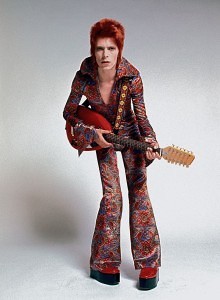
David Bowie, 1971
Rock music fans in general, and Bowie fans in particular, continue to debate which musician(s) Bowie drew upon for inspiration in writing the song, including Iggy Pop, Lou Reed, Marc Bolan, Gene Vincent, and Jimi Hendrix. Bowie himself has said in several interviews that he modeled Ziggy on eccentric 1950s British rocker Vince Taylor, who gradually became unhinged by substance abuse and fame. It is perhaps most likely that Bowie made Ziggy Stardust a composite figure of many rock musicians, but it is unusual that one rock musician is conspicuously absent from the debate: Paul McCartney.
I believe that the historical context in which Bowie wrote and recorded the song, a critical reading of the lyrics to “Ziggy Stardust”, and some clues from The Beatles’ history, will reveal McCartney to be one of Bowie’s inspirations for the character of Ziggy Stardust.
Bowie wrote and recorded “Ziggy” between September 1971 and January 1972, a time when the most important story in rock ‘n’ roll was the very bitter public feud between John Lennon and Paul McCartney following the breakup of The Beatles. The feud began when McCartney released the album Ram in May 1971; Lennon took offense to the lyrics of several songs that he interpreted as personal slights. Lennon responded in kind with the songs “How Do You Sleep?”, and “Crippled Inside”, on his album Imagine, released in September 1971. Two months later, McCartney gave an interview to Melody Maker magazine in which he criticized Lennon and his wife Yoko Ono, refuted Lennon’s attacks in “How Do You Sleep?”, and presented his side of the story of the dissolution of The Beatles’ partnership. The interview so infuriated Lennon that he wrote a response to Melody Maker chiding McCartney for his conceit and demanded it be published in full in December’s issue.
The Lennon-McCartney feud caused Beatles fans, as well as the rock ‘n’ roll community, to choose sides. At the time, Paul seemed an unsympathetic figure and, in comparison to Lennon, he had few allies within the rock music community. McCartney had publicly taken credit for breaking up the band and he had recently sued the other three Beatles to dissolve their business relationship. It also didn’t help matters for McCartney that he seemed to be at a creative low point in 1971. Music critics savaged Ram upon its release, calling it inconsequential and irrelevant. It may be hard to imagine today, but there was a time in Paul’s career when Ringo Starr could say condescendingly about McCartney’s songwriting: “I feel sad about Paul’s albums. . .I don’t think there’s one tune on the last one, Ram. . .he seems to be going strange.”
There is no doubt whose side David Bowie took in the Lennon-McCartney feud. He once called John Lennon “probably his greatest mentor”. In an unforeseen future, Bowie would cover “Across the Universe”, “Mother”, and “Working Class Hero”; he would form a friendship with Lennon and even collaborate with John on the song “Fame”. He may not have consciously thought of The Beatles’ history or the Lennon-McCartney feud as he conceived Ziggy Stardust, but Bowie seemed to write an interpretation of those events in the song’s lyrics:
Ziggy played guitar, jamming good with Weird and Gilly,
And The Spiders from Mars.
He played it left hand, but made it too far,
Became the special man,
Then we were Ziggy’s band.
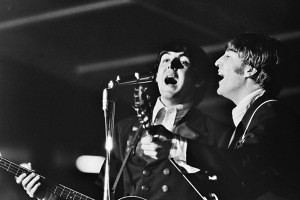
Like Some Cat From Japan
Bowie leaves the identity of the song’s narrator ambiguous. It could be one of the Spiders, a fan, or even Ziggy himself. “Weird” and “Gilly” could be apt pseudonyms for Lennon and George Harrison; “The Spiders From Mars” likewise is a clever insect-related variation on The Beatles’ name. Bowie made reference to Paul’s left-handedness, then implied that McCartney’s fame as a musician, composer, and performer had made him conceited. After Brian Epstein’s death and Lennon’s gradual withdrawal from the band, Paul had anointed himself the “special man” within The Beatles, and his tendency to dominate the others made them complain that they felt like Paul’s sidemen or session musicians.
Ziggy really sang, screwed up eyes and screwed down hairdo
Like some cat from Japan, he could lick ‘em by smiling
He could leave them to hang
He came on so loaded man, well hung and snow white tan.
In four short lines of lyric, Bowie captured Beatle Paul’s appearance and stage presence.
So where were the Spiders while the fly tried to break our balls?
Just the beer light to guide us,
So we bitched about his fans and should we crush his sweet hands?
Bowie describes The Beatles of 1969, when Paul drove the band into Twickenham Studios to begin the process of writing, performing, and recording Let It Be. The strained atmosphere at Twickenham led to the infamous confrontation between Harrison and McCartney.
Ziggy played for time, jiving us that we were voodoo
The kids were just crass,
He was the nazz
With God-given ass
He took it all too far
But boy could he play guitar
Making love with his ego
Ziggy sucked up into his mind
Like a leper messiah
When the kids had killed the man
I had to break up the band.
Ziggy played guitar.
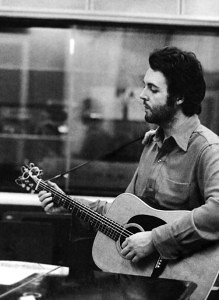
Paul McCartney, 1971
Bowie describes The Beatles’ final chapter: Paul playing for time after John told McCartney, “I want a divorce”; McCartney arguing for live performances to keep the band together and his unwillingness to listen to the others’ opinions. In the final verse, Bowie describes Paul’s reputation during the Lennon-McCartney feud — “like a leper messiah”, references the “Paul Is Dead” conspiracy theory, and McCartney’s announcement that he had broken up The Beatles.
Some interesting post-scripts regarding Ziggy Stardust, David Bowie, and Paul McCartney:
Bowie claimed he adopted the Ziggy persona for two years after the release of the song, although he did not play guitar left-handed nor did he have “screwed up eyes and screwed down hairdo like some cat from Japan”. Instead, Bowie grew out a blonde mullet and looked more like a drag version of Paul’s wife Linda McCartney.
By 1973, Paul McCartney regained commercial and critical success with the release of the albums Band on the Run and Venus and Mars.
Bowie and McCartney did meet for the first time in early 1975 at John Lennon’s apartment at 434 East 52d Street in New York. Bowie allegedly played John and Paul an acetate of his forthcoming album, Young Americans. After the third run-through of the album, Paul reportedly wounded Bowie when he said, “Do you think we could listen to something else?”

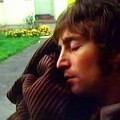
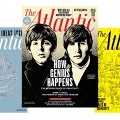


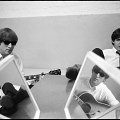
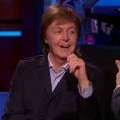

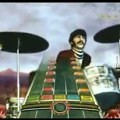
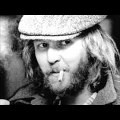
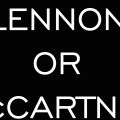

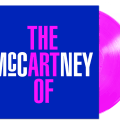
Very canny, this. As a child, before real Beatle-consciousness, when wandering in the record section of the department store, I always associated the cover of Red Rose Speedway (mullet, multicolor, androgyny, wide eyes) with the Bowie covers of the same period: Hunky Dory, Pin Ups, Diamond Dogs.
In the field of literary criticism, this is what’s known as overreading. It would be a legitimate exercise if the Ziggy song was an allegory, in which there’s a one-to-one correspondence between an event in the story and a real event, or a character to a real life person. Or a roman a-clef, a thinly disguised autobiography. But this doesn’t seem like that. It seems like conventional fiction. Tolkien said that a person writes a story “out of the leaf-mould of the mind” any many other writers of fiction and songs have said the same thing — that they draw on bits and pieces of all they’ve known and experienced.
So while there are some similarities between verses in the song and the Beatles, there are just as many similarities to musicians who are not the Beatles. And there are many elements which can’t really be made to fit no matter who hard you try to hammer them into your mold.
For example: “he played it left hand.” Gotta be McCartney, right? Why? Were there no other left handed guitar players out there? I can think of one…
“…with Weird and Gilley and the Spiders from Mars”. So if this is Paul, Weird is Lennon, Gilley is George, that makes Ringo the entire Spiders from Mars? Also, that creates a scene in which he’s describing the band on stage. But Paul doesn’t play guitar in the Beatles band, be plays bass.
” The strained atmosphere at Twickenham led to the infamous confrontation between Harrison and McCartney.” You must know that Harrison didn’t storm out after the filmed “infamous confrontation” between himself and McCartney — he left after and unfilmed argument between himself and Lennon at lunch. Either Harrison or Ringo said it “went back to Hamburg, very deep” but nobody’s ever said what it was.
Bowie sings:
Ziggy sucked up into his mind
Like a leper messiah
When the kids had killed the man
I had to break up the band.
You say McCartney is the leper messiah and also that McCartney broke up the band. But Bowie doesn’t say that Ziggy broke up the band, he said “I” had to. You can’t argue for a scrupulously close reading of one verse and then one line later say, well, close enough. Either it’s consistent or it’s not. You want to have it both ways.
I haven’t spent any time on this, because really there are other things to do, but this jejune analysis is of a piece with what people claim on songfacts: for example, in “Tiny Dancer” that the line “piano man, he takes his stand/in the auditorium” must refer to Billy Joel, because he had a song called “Piano Man”.
The ability to see things as metaphors, not as direct equivalencies, is the last stage in the mental development of the child. Don’t go backwards, man. Give Bowie his due as a great songwriter; don’t make him some hack biographer.
Sir Huddleston, Paul did play guitar on stage many times with The Beatles—in Liverpool, Hamburg, and on American and British TV in 1965. At any rate, this was just my opinion. You’re free to accept it or discard it as you see fit. Thanks for reading!
J.R., I think you’re right that the very public and recent implosion of the Beatles likely fed into the overall concept of “Ziggy Stardust.” But I can’t follow you in seeing Ziggy Stardust as a character Bowie focused on McCartney.
Why, if Bowie sided with John in the Beatles breakup, would he create a character in Paul’s image and then proceed to impersonate that character on stage for years? However you read the lyrics about Ziggy’s fall (and I don’t read them as being as critical of Ziggy himself as you do), that impersonation seems more like emulation than criticism.
And some aspects of Ziggy’s character seem more associated with John than Paul. Wikipedia identifies Ziggy Stardust as “the human manifestation of an alien being who is attempting to present humanity with a message of hope in the last five years of its existence. Ziggy Stardust represents the definitive rock star: sexually promiscuous, wild in drug intake but with a message, ultimately, of peace and love. He is destroyed both by his own consumptions, and by the fans he inspired.” Lennon much? (Except for the alien being part, I’d say.)
I think the parallels between Bowie and McCartney are interesting. Both were glammy in the 70s, have repeatedly reinvented themselves, and love performing and spectacle. Not to mention the mullets.
And that anecdote about McCartney asking to listen to something other than “Young Americans” after hearing the album twice made me laugh!
I think J.R. has completely missed the point of Bowie’s song. It was clearly written about George Harrison. Let’s look at the evidence –
‘Ziggy played guitar’ – George was the lead guitarist in the Beatles.
‘He played it left hand’ – A ‘left footer’ is British slang for a Roman Catholic. George was the only Beatle who was brought up catholic.
‘screwed down hairdo’ – George famously called Beatles hairdos ‘hair don’ts’, literally ‘screwing’ with language.
‘he could lick ’em by smiling’ – George often smiled while playing his guitar licks.
‘while the fly tried to break our balls’ – George was instrumental in bringing the Beatles to India, where there are lots of flies, which can spread malaria.
‘He was the nazz’ – this is a reference to ‘The Nazz’, a monologue by Lord Buckley. George was a big fan of Buckley, and wrote the song ‘Crackerbox Palace’ about him.
‘Like a leper messiah’ – George found his spiritual messiah in India, where there are a lot of lepers.
I think this closes the debate.
I remember reading somewhere that George Martin was sent a demo of “Space Oddity” but passed on it.
There is no “clearly.” And it’s laughable to think anyone knows what was in the mind of a songwriter. What I find hilarious is that anyone would have the balls to judge McCartney’s songwriting, who is clearly one of the 20th century’s greatest, most prolific and inventive songwriters. I love Bowie, but you cannot compare their impact on music and culture. I do love McCartney saying what everyone in that room was probably thinking: For godsakes, play something else.
I always sort of believed David was singing about himself. He is an artist that takes his personal excesses and turns them into art. He was certainly engaging in some extreme behavior in the ’70s. It is actually a miracle he survived.
That photo above of Bowie! He seems to be channeling Eddie Cochran in that picture, from “The Girl Can’t Help It”
Yep. I have long believed this song to be about Paul. I like to call it, “Me and my left-handed bandmate and our band named after bugs, which I had to break up after his ego got out of control.” To call the song “Lennon-influenced” would be a massive understatement.
I really love the image of the leper messiah in the song, and I particularly love the fact that the leper messiah reappears in so many more rock songs over the decades.
I have also posted this theory on the internet before, to the same type of dismissive responses you are getting. I honestly don’t understand why this doesn’t seem obvious to people, but oh well.
“I have also posted this theory on the internet before, to the same type of dismissive responses you are getting. I honestly don’t understand why this doesn’t seem obvious to people, but oh well.”
Because as a theory it doesn’t explain all the evidence very well; there are contradictions galore in the song, and it could just as easily be about Bowie himself: “snow white tan” — if ever there was a time Bowie was talking about himself (and NOT the more olivine McCartney complexion) it was now. Again, adults (and certainly great artists) don’t write allegory — allegory is for children. Adults, great artists among them, write songs or stories out of the mass of experiences and reflections they’ve gathered over their lives — it cheapens their accomplishment to dumb it down to one-to-one correspondence.
The only time an allegory has succeeded (spectacularly) has been Don Maclean, with American Pie. And even then, after 40 years, people can’t tell exactly who he’s talking about in places, and to his credit he won’t say. When somebody asked him what American Pie means he replied “it means I never have to work again.” Good on him.
Jeez, David. It’s just a theory. 🙂 By the way, I just saw “Labyrinth” for the first time yesterday. Truly the work of a great artist.
All kidding aside, I think this is a little saltier than merited, @Sir! Grant us that it’s an interesting, amusing theory — it has certainly made me look at the song and its lyrics anew, which is no small accomplishment for a classic.
I think it’s absolutely essential to remember that great artists, in addition to their awesome greatness, have peers and work-friends and people they hang out with. Just as one of us here might base a song on our neighbor, Bowie and Lennon and McCartney were all peers working in the same field, a small field. So it wouldn’t be so surprising if Bowie would base Ziggy on Paul; and if he did so, it would not be surprising for him to couch it. Heavily.
Not that I buy J.R.’s theory as gospel. But I will think of it the next time I hear “Ziggy Stardust.” And then I’ll hear “John, I’m Only Dancing,” and think: hmmm. ‘Cause great artists tend to connect with people who can relate to the extremely strange life they lead. Like, for example, Mick Jagger. Or…
We normals have about as much in common with John, Paul, Mick and David as if they were aliens. And they gotta get their material from somewhere, once all the childhood memories and makin’-it stories are used up. After we figure out who Ziggy is, we can move on to Paul’s “Rockshow,” tongue firmly in cheek.
Far be it from me to claim an understanding of the staggering genius of any of those guys. Good discussion!
Oh, Sir, I’m sorry — I didn’t mean to shut you down. I’m just trying to keep up the spirit of fun. These guys are all awesome, and so much of the fun of being a fan is having STRONG opinions about them. I just wanted to provide a little cover for J.R., and by extension our Guest Poster Experiment.
No, no, not at all. Please, I hope everybody will express his or herself fully. Thanks for hearing me out. Great website.
“Not that I buy J.R.’s theory as gospel. But I will think of it the next time I hear “Ziggy Stardust.” And then I’ll hear “John, I’m Only Dancing,” and think: hmmm. ‘Cause great artists tend to connect with people who can relate to the extremely strange life they lead. ”
And most people will think this is tin-hat stuff, but about 50% of popular music is ghost-written, so if you ever think you are hearing lyrics that sound like John Lennon or Paul McCartney talking, maybe sometimes you are.
Writing under another name or even impersonating another band gives you a certain freedom in what you write, as Paul has explained many times since he has admitted to doing this often.
Stew, you are right about the song being “Lennon-influenced”. The lyrics read like an outtake from John’s book “In His Own Write”.
*Ahem* Himself or herself. Oy.
Ziggy is far more likely to be modeled after Jimi Hendrix who actually DID play guitar and was lefthanded, than after Paul, who, when this song was written, was not at all known as a guitarist. Paul’s contributions on guitar on Beatles songs weren’t even known at the time Bowie write this song.
And sorry but it makes no sense at all that Bowie — a Lennon fan — would craft an entire character around McCartney and assume his identity on stage.
Every time I read this theory, I find it sillier and sillier.
Sounds plausible, except for the “snow white tan” thing. Far more likely to be Macca than Jimi.
One other point: Bowie had the Ziggy haircut BEFORE Linda. So he wasn’t mimicking Linda or her haircut since HE had it cut this way before SHE did.
J.R., on rereading your post I see that you acknowledge that it’s “probably most likely that Bowie made Ziggy Stardust a composite figure of many rock musicians,” and that DOES make good sense. I can see McCartney being part of that mix, even if I don’t see his part in it as being as large as you do. And I think Lennon’s in the mix as well.
I believe Bowie created Ziggy as an archetype, as The Quintessential 1970s Rock Musician. To me that would explain why he played Ziggy himself, something I can’t see him doing if he were mapping McCartney onto the character very strongly. Despite Ziggy’s faults, overall he comes across as more victim than villain, a tragic figure but not a venal one. So if there were much McCartney in Ziggy, that wouldn’t go with Bowie’s taking Lennon’s side in the Lennon/McCartney feud.
I think the main thing the Beatles breakup probably added to the Ziggy Stardust album and persona was the sense of the 60’s dream of love and peace being over. The atmosphere of doom — the sense that bands break up, that people die or become victims of their own fame — that seems like the emotional driver of the whole project. In it I hear the pall cast by all the late 60s/early 70s rock-related tragedies, like the Manson murders, Altamont, Hendrix’s death, Joplin’s death, etc.
I have to say that the idea of Bowie’s aiming the lines “making love to his own ego” at McCartney and then being mortally offended at Paul’s asking for something other than “Young Americans” to be played after hearing it twice in a row is hilarious. Heck, I don’t think I could listen to even “Revolver” twice in a row without asking for something else!
Hi Nancy,
Thanks for your response! Here’s another funny Bowie anecdote: When Bowie was David Jones, his band The Lower Third opened for The Who in Bournemouth in March 1965. Pete Townshend listened to The Lower Third’s soundcheck, particularly a song called “You’ve Got A Habit of Leaving”. After the soundcheck, Townshend stalked up to Jones and said in an accusing tone, “You’re trying to write like ME!”
Nancy, I think that was the period where Bowie was living on a diet of red pepper and cocaine, so he might not have been in the most even-tempered mood.
Looks like Paul was his fav during that time.
http://i47.tinypic.com/o8ao49.jpg
Has anybody remembered how the Casbah Club was painted, I seem to recall insects and a very large black spider in a web.
I just gave a fresh listen to “Ziggy Stardust” and – for the first time ever – read the lyrics while the song was playing. And as a lifelong McCartney fan, I have to admit that this was my EXACT read on it. I was really startled. I think you nailed it.
Also the similarity between David Bowie and Linda McCartney’s looks at the time – that I am sure is a coincidence, but they could seriously be brother and sister.
I think Bowie especially resembles Linda on the Young Americans cover.
I agree 100% with the author’s analysis. I am the biggest Beatles fan there is, and I’ve always known that Ziggy was indeed Paul. I’ll go one step further: John wrote songs for Bowie, and he definitely wrote this song.
Listen also to the song Venus and Mars by Paul. The lyrics “a good friend of mine studies the stars” is a direct reference to John’s writing of Ziggy Stardust. Paul understood but wouldn’t say it publicly.
Couple observations: Spiders aren’t insects. Paul isn’t particularly well hung (um, just basing this on the fact that he didn’t have as many “lumpy trouser” pics as George and John). And Ziggy didn’t look like a drag version of Linda, he looked like Linda.
@RexS, it’s “follows the stars” not studies the stars, and I always thought that line in Venus and Mars was about John’s fascination with astrology at the time and certain decisions of his being based on that (even though it seemed to be mostly Yoko’s weirdness).
I always thought this too @Michelle, and I think it was a warmup for, or had some other relationship to, Lennon’s aborted plans to come down to New Orleans for the sessions.
Because Paul never suffered from skinny, puny thigh syndrome “lumpy trouser pics” don’t mean a thing.
Agreed. It’s very obvious who the song is about and who wrote it. Paul by John.
Hah, I think random people find this post via SEO also, when they search for “is Ziggy Stardust about Paul McCartney.” Because that’s what I did a few months ago when I first ran across this post and wondered “do people REALLY think that?” 😀
.
I have to admit I find the theory that it’s straight-up about Paul exceptionally unlikely, because it all has to be twisted too much to fit in any way to make the slightest bit of sense that still doesn’t feel right. At most I’m like Nancy in that I think Ziggy could have been a composite of many singers, and Bowie has said as much, though he never mentioned Paul in this context that I know of. Also, the writing is totally credited to Bowie, isn’t it? There’s no additional mysterious songwriter? I honestly don’t know if claiming 100% songwriting credits for ghostwritten work is standard music-industry practice, like nicking is.
.
But as someone who admittedly swims in the “John and Paul were something more than platonic in some way or at some point in time” pool, it amuses me to see people who have their own different theories that everyone else considers crackers behaving with surprise when everyone doesn’t agree with them because it’s right there, oh em gee..
I really did enjoy your analysis. I really obsessively like both Paul and David, and have heard most of their albums, so the idea that one creatively inspired the other is a fun idea for me.
I do think that Ziggy was a stage persona for Bowie, and that he did take it on too far. Bowie did a great album, “Hunky Dory,” that followed “Man Who Sold the World” in getting very little attention. His wife at the time, Angie, suggested he get more theatrical to get attention and he was also influenced by a performance by one of Andy Warhol’s troupe in London at the time, where they was a lot of gender-bending activity and cross-dressing. He combined it all in his mind and came up with Ziggy, and also prophesied Ziggy’s doom, which more or less is what happened to Bowie in ensuing years as his drug use and other excesses nearly killed him.
In contrast, McCartney was always such a cheerful and level guy, down to earth, mother nature’s son. Maybe his persona is some kind of opposite to Ziggy, but I just don’t see the inspiration part. Of course there was a Ziggy-like charismatic power surrounding all the Beatles at that time, but Paul didn’t seem to feed into or off that a lot. If there was a flamboyant, weird, self-destructive Ziggy in the Beatles, it was certainly Lennon– and, as Bowie said, John was a huge influence.
Ziggy Stardust, Alladin Sane, most of Let’s Dance, Heroes, Space Oddity, TIME- he was obsessed. Absolute artistry taken to the nth level. He wasn’t the only one writing about John and Paul either. People were very sympathetic to John’s plight of having to wait and wait for Paul to get the courage to make their dream a reality. Elton had plenty to say. Most of Goodbye Yellow Brick Road, the dual purpose of Captain Fantastic and the Brown Dirt Cowboy is AMAZING. There is even the image of Paul trapped in his left-handed bass as the Linda stork looms over him. Stones sang about it, Donovan has a LOT to say since he was in the middle of the action, even Led Zeppelin had opinions. The Who and The Kinks as well. I’m just scratching the surface of this novel and it’s the most heartbreaking and fascinating story never openly told by someone for no one.
The Rise and Fall of Ziggy Stardust and the Spiders From Mars is considered a concept album, but it’s actually only bits and pieces of what was intended to be a much larger work. There was a storyline that never made it onto the album, and there aren’t enough context clues to piece it together. “All the Young Dudes” was meant to be a central part of it.
Bowie revisited the project several times, and had hoped to complete it in the late ’90s. Unfortunately, his famously short attention span meant he always moved onto something else instead. Suffice to say, there were a lot of sci-fi/apocalyptic elements to it, and it became unfeasible to pull off as an album, a musical, or a film. The result is very much what Who’s Next was to the Lifehouse Project.
As Bowie explained it to William S. Burroughs in 1974 (abridged):
“…Ziggy was in a rock & roll band and the kids no longer want rock & roll. There’s no electricity to play it. Ziggy’s adviser tells him to collect news and sing it, ’cause there is no news. So Ziggy does this and there is terrible news. “All the Young Dudes” is a song about this news. It is no hymn to the youth as people thought. It is completely the opposite … Ziggy is advised in a dream by the infinites to write the coming of a starman, so he writes “Starman,” which is the first news of hope that the people have heard. So they latch onto it immediately. The starmen that he is talking about are called the infinites, and they are black-hole jumpers. Ziggy has been talking about this amazing spaceman who will be coming down to save the earth … Now Ziggy starts to believe in all this himself and thinks himself a prophet of the future starman. He takes himself up to incredible spiritual heights and is kept alive by his disciples. When the infinites arrive, they take bits of Ziggy to make themselves real because in their original state they are anti-matter and cannot exist on our world. And they tear him to pieces onstage during the song “Rock and Roll Suicide.” As soon as Ziggy dies onstage the infinites take his elements and make themselves visible … They really are a black hole, but I’ve made them people because it would be very hard to explain a black hole onstage.”
Burroughs: “Yes, a black hole onstage would be an incredible expense.”
As a matter of fact I read Bowie informing he indeed inspired on Paul McCartney to create Ziggy Stardust. I don’t remember where I read it anymore. But it was quite interesting because he also started speaking a bit like Paul including his gestures. He said in this inteview he lost the times he masturbated listening to Hey Jude. LOL And he compared Paul to Mozart saying John only became more famou because he was killed. I was surprised because he had said about ten years before John was his favouite Beatle. But I do believe he thought it was not ‘cool’ to say anything good about Paul in the early seventies. But, as a Beatle fan, ( Bowie was indeed a Beatle fan) he sure liked the band as a whole.
And…very influenced by MacCartney. Listen to Oh You Pretty Things…and Martha My Dear. Same kind of piano.
Paul didn’t say he was responsible to break the Beatles up. Reporters said so, not Paul. He only gave the information they no longer existed…And it was true. John had left the band in 1969! Paul has correct it lots of times. John broke up the Beatles, not Paul.
And when Bowie introduced his hair- do Linda had another kind of hair. So he didn’t look like Linda. Never. Linda was the one who, much later, copied his style.
It seems some fans indeed were silly enough to think they had to take sides. I don’t think those fans are real fans, come on…Why? No reason to take sides. I was always pro all Beatles. Ringo, John, Paul and George. They were an unity, complementing each other. I don’t know personally any fan that felt they had to be pro John against Paul or vice versa. But I see here in internet some people reacting like that…and they got stuck in the early seventies. The Beatles moved on, they met again, they solved their problems…but these fans could not move…They could not understand the lesson the Beatles gave to us. Fight…yes. And also Forgive. That is what counts. Forgive. Love prevailed in the Beatles story. Except for these people that were unable to see it was not possible to take parts as all of them were terribly wrong! All of them made mistakes. John was terrible…maybe the nastiest. But I never stop loving him. I never stop loving them all though I felt sad they were in such darkness. I had faith they would see the light. And they did. However, some fans seems to enjoy the negative moments and till today they …don’t see the light and so, they can’t see the beauty in the Beatles Story.
As for that day when John, Paul and David Bowie got together…I heard Bowie could not stop playing the same song. Not the whole album. Young Americans. And Paul asked if they could listen to other song. That is what I read in several occasions. First time I read it was the whole album. But I was not there to know which version is the right one. I also read he got upset with John that accepted well what Paul had asked.
Linda’s brother, John Eastman, worked for David Bowie. I mean, he was contracted to solve one problem he had. I have no details about it. But I can see Paul suggesting his name to David Bowie. John Eastman was kind a good lawyer.
It seems the song Jet is inspired on Bowie, by the way. And it is true Paul painted Bowie, his portrait showing him puking. LOL. He said he didn’t know it was Bowie, but when it was over he noticed he had painted him. Linda was the first to notice that. When Bowie passed Paul wrote a beautiful tribute to him remembering the laughers they had together. So, they do became close. He was also very close to Stela MaCatney who also wrote a tribute.
You forgot to mention about God’s given Ass…Of course it had to be Paul.